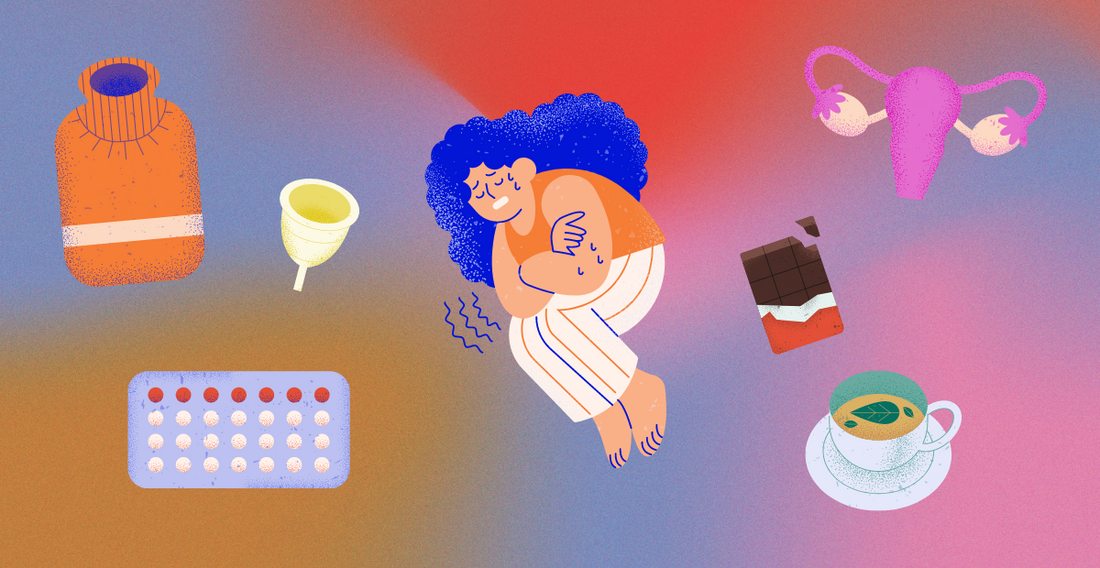
What Is PMS?
Share
What Does PMS Mean?
PMS stands for premenstrual syndrome. It is a commonly used term to describe a set of physical, behavioral, and emotional symptoms experienced in the days or weeks leading up to menstruation. PMS occurs due to hormonal fluctuations in the menstrual cycle. The exact cause is not fully understood, but it is believed to involve changes in serotonin levels, sensitivity to hormone changes, and neurotransmitter imbalances.
PMS symptoms can vary widely among individuals and may include physical discomfort, mood swings, irritability, fatigue, and changes in appetite. Proper self-care, lifestyle adjustments and medical interventions can help manage PMS symptoms effectively.
What Are the Symptoms of PMS?
Here are the most common symptoms of PMS.
Physical Symptoms
- Acne
- Back pain
- Breast pain (tenderness or swelling)
- Bloating
- Cramps
- Headaches or migraines
- Muscle aches and joint pain
- Digestive issues (constipation or diarrhea)
Behavioral & Emotional Symptoms
- Anxiety
- Changes in libido (sex drive)
- Cravings and changes in appetite
- Crying spells
- Depression
- Fatigue
- Irritability
- Memory lapse
- Sad
- Sensitive
- Sleep disturbances (insomnia or excessive sleepiness)
Not all menstruators experience all of these symptoms, and the severity and duration can vary. It is essential to track your symptoms using tools like the Orchyd app to learn more about your cycle patterns and better understand when a symptom and the severity are normal. With Orchyd keeping track, you can more easily consult with a healthcare professional or a doctor through Orchyd MD™ when something seems off.
When Does PMS Begin?
PMS typically begins a few days to two weeks before the start of menstruation. The timing can vary among menstruators and may differ from one menstrual cycle to the next. Symptoms commonly start around the midpoint of the menstrual cycle, which is approximately 14 days before the start of the next period. However, some individuals may experience early onset PMS symptoms even before the midpoint. Others may notice symptoms closer to their period's onset. The Orchyd app will notify you for each phase of your cycle so you will always feel in sync with your body.
In general, tracking and monitoring your menstrual cycle is important to better understand when PMS symptoms emerge and prepare better.
What Causes PMS?
PMS is believed to be caused by a combination of factors, with hormonal changes playing a significant role. Fluctuations in estrogen and progesterone levels during the menstrual cycle are thought to contribute to the onset of symptoms.
After ovulation, estrogen levels decline while progesterone levels rise. During this time, the luteal phase, PMS symptoms tend to emerge. The decrease in estrogen and the increase in progesterone can affect various systems in the body, including the brain and nervous system.
These hormonal changes can influence neurotransmitters, particularly serotonin, which regulates mood. Fluctuations in serotonin levels are associated with the emotional symptoms of PMS, such as mood swings, irritability, and depression.
Moreover, some menstruators may be more sensitive to these hormonal fluctuations and experience stronger effects on their physical and emotional well-being. Genetic factors may also contribute to the development and severity of PMS symptoms.
While hormonal changes are a crucial factor, other influences, such as stress, lifestyle, and underlying medical conditions, can also impact the severity of PMS symptoms. Proper self-care, stress management, exercise, and dietary adjustments may help alleviate symptoms for some individuals. For severe cases, medical interventions like hormonal therapies or antidepressants may be considered.
Could It Be PMDD?
If you suspect your symptoms may go beyond typical PMS, the possibility of PMDD (premenstrual dysphoric disorder) is worth considering. PMDD is a more severe form of PMS that can significantly impact your daily life. The symptoms of PMDD are similar to those of PMS but are generally more intense and disruptive. These symptoms can include severe mood swings, heightened anxiety or irritability, extreme fatigue, and difficulty concentrating. Consulting with a healthcare professional for an accurate diagnosis and appropriate management is essential. They can help differentiate between PMS and PMDD and suggest treatment options, such as medication, therapy, or lifestyle changes, to address your specific needs. So, be sure to consult with your physician or chat with a doctor through Orchyd MD™. Appointments are available whenever you need one and cost less than the average co-pay; no insurance is necessary.
How To Manage PMS
To effectively manage PMS consider the following strategies and remember that what works for you may not work for another. So, find a combination of strategies that best suits your needs and the symptoms you track.
Maintain a healthy lifestyle: Regular exercise, balanced meals, and sufficient sleep can help alleviate symptoms.
Monitor and track symptoms: Track your symptoms in the Orchyd app to identify patterns and anticipate their onset.
Stress management: Engage in relaxation techniques like meditation, deep breathing, or yoga to reduce stress levels.
Dietary adjustments: Limit caffeine, salt, and refined sugars while increasing intake of whole foods, fruits, and vegetables.
Supplements: Certain supplements like calcium, magnesium, and vitamin B6 may help relieve symptoms.
Medication: Consult a healthcare professional who may recommend over-the-counter pain relievers or prescribe hormonal contraceptives or antidepressants for severe cases.
Emotional support: Seek support from loved ones, join support groups, or consider therapy to manage emotional symptoms.
How Can Orchyd MD™ Help With PMS?
Orchyd MD™ connects you directly to a doctor who can help support and manage PMS. Your doctor can provide a comprehensive evaluation to confirm the diagnosis and rule out any underlying conditions. Based on the severity of symptoms, they may recommend various treatment options, including hormonal contraceptives, selective serotonin reuptake inhibitors (SSRIs), or other mood stabilizers to regulate hormones and alleviate emotional symptoms. In some cases, diuretics or pain relievers may be suggested for specific physical symptoms.
Between Orchyd MD™ and Blossom™, your personal AI assistant, you can receive guidance on lifestyle modifications, including exercise routines, dietary changes, stress management techniques, and relaxation exercises. Regular follow-ups within Orchyd MD™ can help monitor progress, adjust treatment plans, and ensure the most effective management of PMS symptoms.
Can Birth Control Help?
Like we offered above, birth control can assist with PMS. Hormonal contraceptives, such as combination oral contraceptives or hormonal patches, can help regulate hormone levels and alleviate PMS symptoms. These medications work by preventing ovulation and stabilizing hormone fluctuations throughout the menstrual cycle. By providing a consistent hormone balance, birth control can reduce the severity of physical and emotional symptoms associated with PMS.
However, it's important to note that individual responses to birth control may vary, and it may take some trial and error to find the most suitable contraceptive method for managing PMS. Consulting with a healthcare professional is recommended to discuss the potential benefits and risks of using birth control for PMS management.
If you need to refill your birth control prescription, Orchyd MD™ is here to help. Just have your prescription and details on hand and start the chat when ready.
PMS is uncomfortable, but it is manageable with Orchyd by your side. You can track your symptoms, learn more about your cycle, get the support you need, and have an all-around easier flow.

